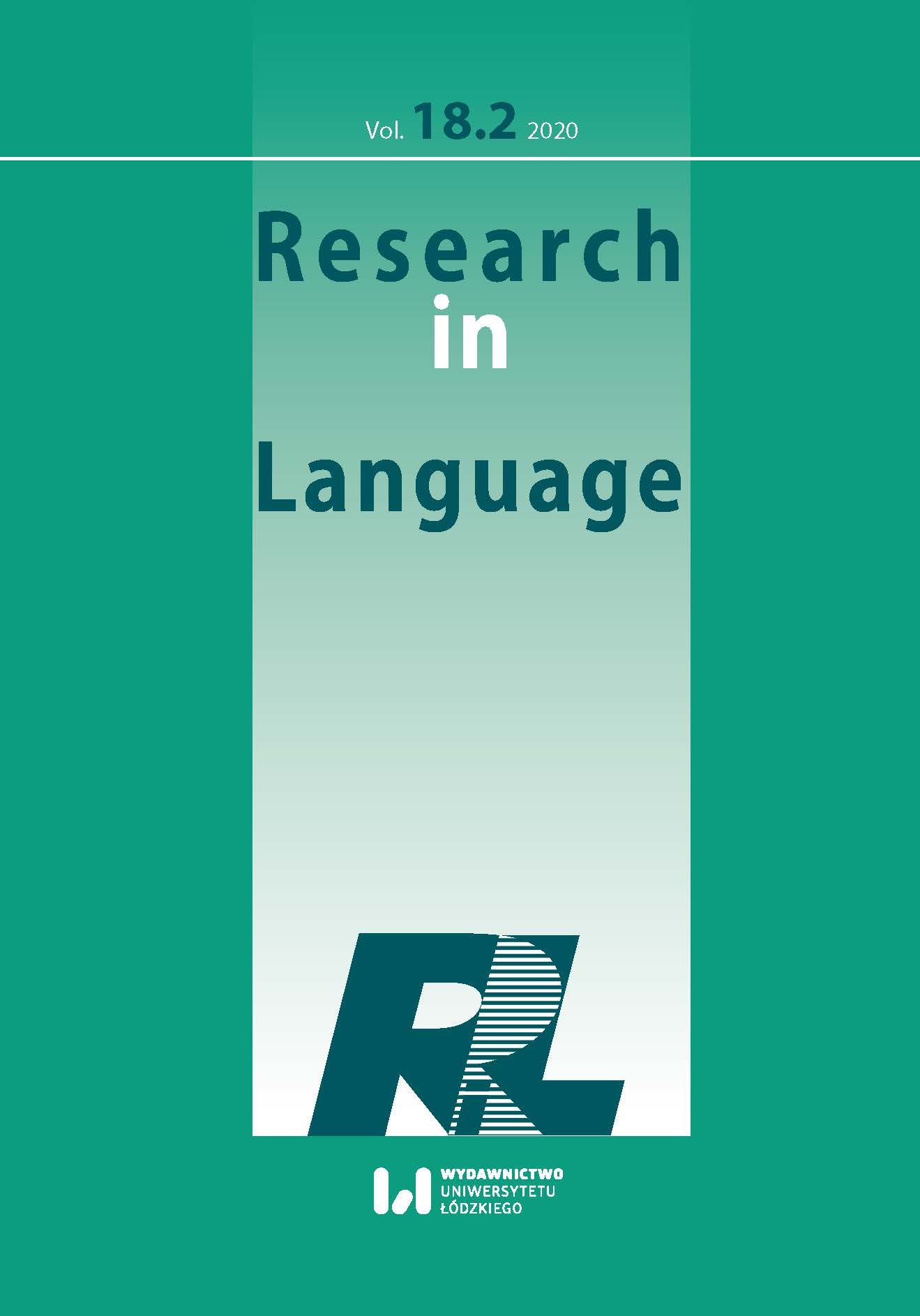Inside and Outside the Translation Classroom
DOI:
https://doi.org/10.18778/1731-7533.18.2.07Keywords:
translator training, technology and teaching, translator educationAbstract
The article provides a glance at the continuing transformation in the profession of translators and its implications on translator training. The profile of the translatorhas never been unified but nowadays, following the pandemic situation in the year 2020, the profession undergoes a significant shift as a result of the economic situation and the effects of the pandemic restrictions on the condition of the labour market. The widespread use of technology and new requirements involving distance learning call for rethinking the aims of translator training.
The primary purpose of the article is to signal the need for adapting translator training to foster better metacognitive skills that help translation students adapt to the evolving market. The article makes an attempt to look at the potential of distance translator training for introducing more professionalization into translator education. Moving outside the regular translation classroom to virtual training environments can in fact entail the learner transformation not only as regards technology immersion but also their autonomy.
References
Baker, Linda. 1989. Metacognition, comprehension monitoring, and the adult reader. Educational Psychology Review, 1, 3-38. https://doi.org/10.1007/BF01326548
Google Scholar
DOI: https://doi.org/10.1007/BF01326548
Baker, Linda. 1994. Fostering metacognitive development. In Hayne W. Reese (eds.), Advances in Child Development and Behavior, vol. 25, 201-239. San Diego: Academic Press. https://doi.org/10.1016/S0065-2407(08)60053-1
Google Scholar
DOI: https://doi.org/10.1016/S0065-2407(08)60053-1
Bransford, John D., Brown Ann L., and Cocking Rodney R. 2000. How people learn: Brain, mind, experience, and school. Washington, D.C.: National Academy Press.
Google Scholar
Brown, Ann L. 1978. Knowing when, where and how to remember: A problem of metacognition. In Robert Glaser (ed.), Advances in instructional psychology, vol. 1, 77-165. Hillsdale, NJ: Lawrence Erlbaum.
Google Scholar
Bundgaard, Kristine. 2017. Translator Attitudes Towards Translator-Computer Interaction – Findings from a Workplace Study. HERMES-Journal of Language and Communication in Business, 125–144. https://doi.org/10.7146/hjlcb.v0i56.97228
Google Scholar
DOI: https://doi.org/10.7146/hjlcb.v0i56.97228
EMT Expert Group (2009) Competences for professional translators, experts in multilingual and multimedia communication, Brussels, European Commission.
Google Scholar
EMT Expert Group, 2017. Competence Framework 2017. [Online] Available at: https://ec.europa.eu/info/sites/info/files/emt_competence_fwk_2017_en_web.pdf (Accessed 3 January 2020)
Google Scholar
Lörscher, Wolfgang. 1991. Translation performance, translation process, and translation strategies: A Psycholinguistic investigation. Tübingen: Gunter Narr.
Google Scholar
Garner, Ruth and Alexander, Patricia A. 1989. Metacognition: Answered and unanswered questions. Educational Psychologist, 24, 143-158. https://doi.org/10.1207/s15326985ep2402_2
Google Scholar
DOI: https://doi.org/10.1207/s15326985ep2402_2
Garner, Ruth. 1990. When children and adults do not use learning strategies: Toward a theory of settings. Review of Educational Research, 60, 517-529.
Google Scholar
DOI: https://doi.org/10.3102/00346543060004517
González Davies, Maria. 2004. Multiple Voices in the Translation Classroom. Amsterdam: John Benjamins. https://doi.org/10.1075/btl.54
Google Scholar
DOI: https://doi.org/10.1075/btl.54
Göpferich, Susanne. 2009. Towards a Model of Translation Competence and its Acquisition: The Longitudinal Study Transcomp. In: Göpferich, Susanne. Jakobsen, Arne. L. and Mees, Ingrid. M. (eds.), Behind the Mind. Methods, Models and Results in Translation Process Research. 11-37. Copenhagen: Samfundslitteratur Press.
Google Scholar
Gouadec, Daniel. 2007. Translation as a Profession, Amsterdam/Philadelphia: John Benjamins. https://doi.org/10.1075/btl.73
Google Scholar
DOI: https://doi.org/10.1075/btl.73
Haro-Soler, Maria and Kiraly, Don. 2019. Exploring Self-efficacy Beliefs in Sym¬biotic Collaboration with Students: an Action Research Project. The Interpreter and Translator Trainer, 13(3). 255-270.https://doi.org/10.1080/1750399X.2019.1656405
Google Scholar
DOI: https://doi.org/10.1080/1750399X.2019.1656405
Kelly, Dorothy. 2005. A handbook for translator trainers; A guide to reflective practice, London/New York: Routledge.
Google Scholar
Kiraly, Don. 1995. Pathways to Translation: Pedagogy and Process. Kent: Kent State University Press.
Google Scholar
Kiraly, Don. 2000. A Social Constructivist Approach to Translator Education. Empowerment from -Theory to Practice. Manchester, St. Jerome.
Google Scholar
Kiraly, Don. 2015. Occasioning Translator Competence: Moving beyond Social Constructivism towards a Postmodern Alternative to Instructionism, Translation and Interpreting Studies, 10(1) (Special Issue), 8-32. https://doi.org/10.1075/tis.10.1.02kir
Google Scholar
DOI: https://doi.org/10.1075/tis.10.1.02kir
Kiraly, Don. 2016. Authentic Project Work and Pedagogical Epistemologies: A Question of Competing or Complementary Worldviews? In Donald C. Kiraly et al. (eds.), Towards Authentic Experiential Learning in Translator Education. 53-66. Mainz, Mainz University Press. https://doi.org/10.14220/9783737004954.53
Google Scholar
DOI: https://doi.org/10.14220/9783737004954.53
Kiraly, Don. 2019. A Human Pyramid (castell): A Metaphor for Authentic Project Work, Keynote Speech at APTIS Conference 2019 (Association of Programmes in Translation and Interpreting Studies, UK and Ireland) 23-24 November, Presentation, DOI: 10.13140/RG.2.2.28589.03047
Google Scholar
Klimkowska, Katarzyna. 2013. Orientacja na sukces zawodowy studentów kończących studia translatorskie. Lublin: Wydawnictwo Uniwersytetu Marii Curie-Skłodowskiej.
Google Scholar
Klimkowski, Konrad. (2015). Towards a shared curriculum in translator and interpreter education. Wrocław/Washington, D.C.: WSF, PAN and International Communicology Institute.
Google Scholar
DOI: https://doi.org/10.18290/rh.2015.63.11-5
O’Brien, Sharon, Ehrensberger-Dow, Maureen, Hasler, Marcel and Connolly, Megan. 2017. Irritating CAT Tool Features that Matter to Translators. HERMES-Journal of Language and Communication in Business, 56, 145-162. https://doi.org/10.7146/hjlcb.v0i56.97229
Google Scholar
DOI: https://doi.org/10.7146/hjlcb.v0i56.97229
PACTE. 2003. Building a Translation Competence Model. In Fabio Alves (ed.), Triangulating Translation: Perspectives in process oriented research. 43-66. Amsterdam/Philadelphia: Benjamins. https://doi.org/10.1075/btl.45.06pac
Google Scholar
DOI: https://doi.org/10.1075/btl.45.06pac
Pietrzak, Paulina. 2018. The effects of students’ self-regulation on translation quality. Babel: International Journal of Translation ,64(5/6). 819-839. https://doi.org/10.1075/babel.00064.pie
Google Scholar
DOI: https://doi.org/10.1075/babel.00064.pie
Pietrzak, Paulina. 2019a. Scaffolding student self-reflection in translator training. Translation and Interpreting Studies, 14(3). 416-436. DOI: doi.org/10.1075/tis.18029.pie
Google Scholar
DOI: https://doi.org/10.1075/tis.18029.pie
Pietrzak, Paulina. 2019b. An integrated approach to assessment in translator training: the value of self-reflection. In Barbara Lewandowska-Tomaszczyk (ed.), Contacts and Contrasts in Educational Contexts and Translation. 105-115. Berlin Heidelberg: Springer. https://doi.org/10.1007/978-3-030-04978-2_7
Google Scholar
DOI: https://doi.org/10.1007/978-3-030-04978-2_7
Pietrzak, Paulina and Kornacki, Michał. 2020. Using CAT Tools in Freelance Translation: Insights from a Case Study, New York: Routledge. https://doi.org/10.4324/9781003125761
Google Scholar
DOI: https://doi.org/10.4324/9781003125761
Pym, Anthony. 2003. Redefining Translation Competence in an Electronic Age. In Defence of a Minimalist Approach. Meta: Translators’ Journal, 48(4), 481-497. https://doi.org/10.7202/008533ar
Google Scholar
DOI: https://doi.org/10.7202/008533ar
Schraw, Gregory; Wise, Steven L.; and Roos, Linda L. 2000. Metacognition and Computer-Based Testing. In Gregory Schraw and James C. Impara (eds.),Issues in the Measurement of Metacognition. Lincoln, NE: Buros Institute of Mental Measurements.
Google Scholar
Downloads
Published
How to Cite
Issue
Section
License

This work is licensed under a Creative Commons Attribution-NonCommercial-NoDerivatives 4.0 International License.










